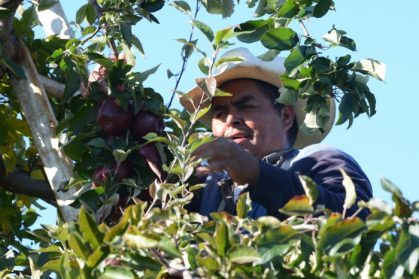
Dave Smeltzer
#TheLand #ManisteeCountyAgriculture
By Rob Alway, Editor-in-Chief.
ONEKAMA TOWNSHIP (Manistee County) — Up on M-22, about between Onekama and Arcadia, is orchard country. Much of the orchards in this area are owned by Westwind Orchards, which is part of the Smeltzer family legacy of farming in these parts.
The land this M-22 runs through is some of the best fruit producing land in the country. This was something that William Smeltzer figured out in the late 1880s when he, along with his wife and nine children, moved to northern Manistee County from Ontario to become a fruit farmer. The particular land that William homesteaded, which is located along modern day U.S. 31, turned out to be too sandy to farm, so two years later the family moved and homesteaded land just north of the Manistee-Benzie counties line along what is now Joyfield Road. To this day, William’s descendants still live and farm on the original farmstead.
South about 10 miles from the original homestead, at the corner of M-22 and 13 Mile Road, on the border of Onekama and Arcadia townships, is Westwind Orchards, a farm owned by William’s great-grandson, Clinton, and great-great grandson, Dave. The orchard raises 125 acres of apples and 50 acres of cherries. It was founded by Clinton and his father, Percy, in 1944.

Clinton Smeltzer stands outside one of the storage facilities.
At 93-years-old, Clinton is still part of the farm ownership and management. Dave, 59, oversees the daily operations of the farm and lives in the house he grew up in on the farm, along with his wife, Jennifer. Clinton now lives on the shores of Crystal Lake north of Frankfort.
Clinton says he was at the farm every day until about the mid-90s when his wife, Jean, became ill. Jean died in 2001.
“I have done nothing but farm all my life,” he says, sitting in his office. “I started driving horses at 6-years-old. Of course, the horses knew more than I did but I kept them in the field. I’ve been doing this ever since.
“My father and his brothers started working together as Smeltzer Brothers Inc., a retail dairy, in 1930,” Clinton says. I started delivering milk when I was 10-years-old. My brother, Percy, drove the truck. I drove the truck myself when I was 14. The dairy moved to Manistee in ’36 and it was a pretty big operation. But, the labor became scarce so they just quit (in 1946). It was a poor way to stop a business, you lose accounts.”
Percy (the senior) and his brothers then started Smeltzer Orchard Company located near the original family farmstead on Joyfield Road.
 After high school Clinton enrolled at Michigan State University and joined the East Lansing Fire Department. “I spent some time in the military and then came home. There was this farm for sale, across the corner,” he says pointing, to the southwest out the window from his office, towards a small section of the farm. “We bought that in late July of ’44. It was 52 acres with 10-year-old apple trees. We picked 8,000 bushels of apples and the prices were unheard of,” he pauses and smiles. “We did well.”
After high school Clinton enrolled at Michigan State University and joined the East Lansing Fire Department. “I spent some time in the military and then came home. There was this farm for sale, across the corner,” he says pointing, to the southwest out the window from his office, towards a small section of the farm. “We bought that in late July of ’44. It was 52 acres with 10-year-old apple trees. We picked 8,000 bushels of apples and the prices were unheard of,” he pauses and smiles. “We did well.”
Two years later, Clinton’s brother, Percy, was honorably discharged as a captain, after serving six years in the Army. He returned home and bought his own farm on Upper Herring Lake in southern Benzie County. Percy passed away in 2004 at the age of 85.
Clinton and his brother, Percy, started Per-Clin Orchards in the early 1960s, which included a cold storage facility. The farm became the first in northern Michigan to use controlled atmospheric storage. The method allows for the apples to remain fresh, in cold storage, from the fall harvest until late spring of the following year.
After Percy’s death, the farm was divided up. Clinton and Dave re-formed their portion of the operation as Westwind Orchards while Per-Clin Orchards continued to own the cold storage operation, with Westwind managing it. Per-Clin markets its apples to major national food distributors.
 The Harvest
The Harvest
This year’s harvest has been a major contrast to last year. The orchard, like most in Michigan, saw massive yields.
“The 2016 apple crop in northern Michigan and all of Michigan is very large,” Dave says. “In early August, the projections were that the state would be producing 31 million bushels of apples, which is a little higher than the five year moving average. The great harvest was because of last winter being mild, also we didn’t have a lot of diseases this year and we didn’t have a lot of rain this summer, which meant for a very slow growing season. It’s been paying dividends this fall.”
Dave says the harvest, which ended last Saturday, began in mid-September with employees working six days a week. He adds that the fall’s mild weather has meant there were very few days when the weather caused a work stoppage.
“We pick six days a week but always take Sundays off,” he says. “People need to rest. No matter what, we take Sundays off.”
Dave says abundance has its set of challenges, but they are mostly positive challenges. One of those challenges was the problem of where to store all the extra apples this year.
Change
Both Dave and Clinton have seen changes in farming over the years. Clinton recalls a time when the farm employed over 300 people during cherry picking season. Mechanical shakers have reduced that workforce down to a fraction of that number. Apples, however, still need to be picked by hand. The job today requires 16 to 24 people.
Clinton says through the years labor has been harder to come by.
“There used to be a local labor force that was waiting for a chance to work,” Clinton says, adding that today that isn’t the case.
Though the practice of picking apples hasn’t changed much, the way they are grown has changed dramatically.
“When I was a boy, trees were 30 to 35 feet apart in a very large canopy,” Dave says. Genetically modifications have created dwarfed root stocks, allowing trees to be planted closer, 3 to 4 feet apart, which means that more trees can be planted. At the same time, the newer trees are also growing larger fruit.
The Lake
William Smeltzer, Dave’s great-great grandfather, learned early on that a close proximity to Lake Michigan was the key to successful fruit growing, which is why five generations later, the family continues to farm here.
“Lake Michigan is the driving force behind why we can grow fruit here in west Michigan,” Dave says. “You can take a map and put a straight edge ruler from the base of Leelanau County to Grand Haven and see how much of west Michigan sticks out into Lake Michigan, especially from Ludington, through Manistee County, Benzie County, and lower Leelanau County, we stick out into Lake Michigan. This controls the climate and provides us with a good snow cover in the winter. It can also prevent a lot of frost. We call it the frost line, which extends east 9 miles from Lake Michigan. Lake Michigan also provides ample rain in the summer. Here, on our farm, we are roughly 300 feet above Lake Michigan and 800 feet above sea level. It’s an ideal location for growing apples and cherries.
 Family and work
Family and work
Like most farmers, family is an important element to the Smeltzer operation. The family takes great pride that it has farmed this area for generations. It has extensive records. But, family goes beyond blood, Dave says.
“The one real enriching component of farming is the family component,” Dave says. “Not just your blood relatives but the people who work for you. We have two employees who have worked here for over 40 years. There is a gentlemen who worked for my father for 42 years before he retired. There’s really a neat component of farming that allows for that. I get to work outside. People work all their lives to be in a place where I get to wake up to every morning and it’s enriching. It’s a great life. There is something new every day. I get to work outside and get to be part of the environment, part of the earth, and part of the dirt.”
Dave and Jennifer raised two daughters on the farm. Abigail, 25, now lives in Traverse City and works as a flight instructor. Madeleine, 20, is currently enrolled at Northwestern Ohio University where she is studying agricultural science. Dave says Madeleine has not yet decided what career path she wants to take. Naturally, she is welcome to come back to the farm, but the decision is hers, he says.
“Either way, I’m proud of both of them and proud of the life we were able to provide them here. I think we’ve given them the values of farming and know those values will continue to be passed on.”









































 (1).gif)











.png)







